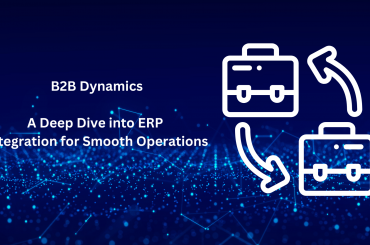The term Business intelligence refers to the software that is designed to analyze, retrieve, and deliver actionable data, assisting organizations to make tactical and critical business decisions. The organization gathers the information from internal or external resources, make analysis on the information, execute queries and provides comprehensive intelligence reports to the business users about the business statics, which helps them in decision-making and strategic planning.
Business intelligence application mainly focuses on making an efficient business decision that helps an organization to improve operational effectiveness, increase revenues, and achieve competitive benefits among business rivals. A combination of data management, analysis, and various tool & methodologies are being used by businesses to access the business’s insights for improved efficiencies and higher profitability.
Folio3 Dynamics is Your Custom Business Intelligence Applications Partner
Folio3 is a leading technology solution provider helping businesses to integrate microsoft dynamics business intelligence seamlessly. The company brings in powerful BI dashboard solutions meant to assist companies across all sectors to get insightful metrics and measure KPIs from various business functions and make intelligent business decisions.
With some of the leading industry experts and decades of experience developing innovative tech products, Folio3 got the experience, expertise, and resources required to help integrate customized Business Intelligence (BI) systems from third-party solutions to meet the unique needs and requirements of the companies. The company has previously served hundreds of companies to create integrated dashboards for BI, enabling decisions makers to access all the important business metrics and KPIs in form of interactive reports and charts to help them with;
- Real-time monitoring and assessment of performance metrics
- Access to detailed and interactive reports for organizational data
- Improved productivity with efficient workflow processes
- Access customized graphical reports for critical business data for a better understanding
15 Business Intelligence Applications and Use Cases in Today`s World
Technology
It won’t be wrong to say that business intelligence is developed by the tech sector. I mean, who would have in their right mind thought of capturing such a massive volume of data without the cloud computing technology?
However, the tech sector isn’t only credited for the development of the business intelligence applications, rather the sector also uses these powerful tools (perhaps greater than any other sector) to improve on its processes and come up with more innovative and value-added solutions for customers.
The world’s largest and perhaps the greatest tech company Google is known for its data obsession. However, the company doesn’t only use data solutions to surveil customers, rather it also leverages its power in business intelligence solutions to improve its in-house processes and improve procedural efficiencies.
The tech giant maintains a dedicated team “People Analytics”, which is meant to collect employees’ opinions regarding common employment queries. For instance, if there is an actual need for managers or what exactly should be the role of managers, or what are the characteristics of best managers, and so on.
Such opinionated queries help the tech giant to improve the company culture inside the company and design more efficient workflow processes and promote innovation within the company.
Grow
Grow is a self-service BI and data visualization company offering businesses a chance to leverage the power of business intelligence for making better decisions. The company utilizes a business intelligence solution to understand its users’ buying journey from the free trial version. The whole process of data gathering was meant to understand the preferences of free users from the software solution.
While the company thought that users were more interested in getting accurate data visualization as compared to the speed, however, the insights showed the other way. The survey showed that users were more interested in getting the data visualization faster. This prompted the company to streamline the data visualization capabilities of its solution. Today, users are able to create the visualization using the Grow platform within 15 minutes, as opposed to 90 minutes required to do the same task previously.
Lending Club
Lending Club is another great business intelligence application example where the company utilized business intelligence to optimize its workflow processes for users. Lending Club is a digital lending company that utilized business intelligence applications to perform series of A/B testing.
By switching to a business intelligence solution for A/B testing, the company was able to run a dozen tests per week, while previously they were only able to conduct less than half a dozen per year. This massively improves the company’s position for users, as they were able to make numerous small tweaks to better adhere to the customers’ preferences and have since reported a massive boost in revenues.
Retail
The retail industry is one of the largest users of business intelligence applications. The rise of the ecommerce industry for once has completed altered the retail industry, as today the online retail stores make up almost half of all the retail shopping. The online marketplace has made it possible for businesses to capture a massive volume of data, making them an ideal client for business intelligence solutions.
Today, the online retail industry has actually started to open brick-and-mortar stores, leveraging the massive intelligence gathered from business intelligence applications. Below are some business intelligence applications examples from the retail industry;
Payless Shoes
The single-click checkout process that has been popularized by Amazon might seem to be the most preferred checkout system to many. However, the business intelligence tests performed by Payless Shoes revealed something extraordinary.
Payless Shoes identified a unique customer preference for a two-click checkout process, instead of one streamlined process. That’s because most customers want to review the carts before committing to the purchase. Now, this finding is opposite to the conventional wisdom of the online retail industry that takes fewer clicks for a better customer experience. Nonetheless, it turned out not everyone likes to rush through the purchasing and if not for business intelligence, we wouldn’t have known this unique clients’ preference.
Stitch Fix
Stich Fix works with a unique business model where the company sends customers a customized box of clothing based on customer’s responses to a brief questionnaire about their style. The customers get the liberty to keep the clothing they like in the box while returning the rest (free of charge). The company had to rely on professional stylists, as well as, robust algorithm to be able to connect the customers’ preference for personal styling from their responses to the questionnaire.
To make it happen, Stitch Fix relies on a business intelligence solution that allows its algorithms to get familiarized with the customers’ style choices with time. Getting familiarized with the users’ sartorial taste isn’t an easy task and without the artificial intelligence business applications, it would not have been possible for the company to guess the taste correctly.
Target
Target used artificial intelligence business applications to track customers’ shopping. In one particular case, the tracking becomes too creepy as the company’s algorithms were able to identify pregnancy based on users’ shopping choices (maternity jeans, or pregnancy tests) even before the family knew it. This leads the company to send users coupons for related products like diapers or cribs, which freaked out the father (who didn’t know till then), resulting in him complaining to the manager.
Today, the target is using business intelligence applications to send well-structured mail ads to users ensuring they don’t cross the line between “useful” and “creepy”.
Social Platforms
Social media platforms are become part of our lives, with no boundaries. With billions of active monthly users, these platforms have become the hub of data for companies looking to hyper-targeting their ads over the internet. Social media platforms themselves utilize smart artificial intelligence business applications to collect key user data that enable them to run hyper-targeted campaigns. Below are some business intelligence application examples for social media platforms;
From the very beginning, the character limit for Tweets has remained a hot topic of debate among users. For some, the 140 character limit for tweets was too restrictive and made it hard for users to express themselves adequately. However, for others (read majority), the character limit actually made Twitter a better platform for rational users. For them, the character limit saved twitted from wordy screeds.
Nonetheless, when Twitter doubled its character limit to 280, there was yet again an uproar with many users calling it the end of twitter’s distinction amongst the other social media platforms. However, what users didn’t know was that the platform had performed its due diligence using business intelligence applications. In reality, the increased character limit just makes it easier and faster for users to express themselves without adjusting and condensing to the count limit.
Facebook with over 2 billion active monthly users is the largest and biggest social media platform. However, the social media giant has also been the root of various controversies from creepy data usage to monopoly and various other controversies.
However, recently the platform has been accused of causing a dip in users’ mental health. The cause for this mental dip is users’ comparison of actual lives to the carefully-curated lives of other people online. Also, the number of “likes” has been impacting the mental health of users; only compounding the issue.
To counter this negative trend, Facebook is already experimenting with making the number of likes private to the original poster only. While this experiment isn’t started in the USA yet, the company is already performing these tests in certain countries including Canada, and Japan.
TIKTOK
TikTok takes data analytics to another level. The platform’s data analytics capabilities are so efficient that it has made browsing for videos almost obsolete for users. The app immediately starts showing users the related videos, as soon as they open its “For You” tab. With time, the users are able to train the app’s algorithms for their liking by reacting to the videos. As the users indicate, within a short time the number of “Hard-likes” diminishes for users, indicating the powerful algorithms that are able to identify users’ taste correctly every time. This reflects the strong utilization of business intelligence by the platform to train its algorithms for users’ liking.
FOOD & DRINK
American diet can be bizarre for many people outside of the USA. The people here eat just way too many calories, whereas, they also get less time to eat proper meals during the day.
For food companies, the eating habits and routine of people are just business opportunities, as they collect business intelligence for people’s eating habits to come up with personalized offerings.
Starbucks
The Starbucks app is popular for its rewarding system. The app frequently rewards coffee lovers with free drinks. Tempting deals and other rewards. However, at the back end, the app utilizes business intelligence to track the users’ preferences for their preferred drinks and throw them with tempting deals. And while on the surface it may appear tempting for users to get a free deal for their favorite drink, the ultimate aim of the company is to retain the regular customers and draw them towards the store through customized deals.
Kroger
Just like most chain stores, Kroger tracks the purchasing behavior of its customers through the loyalty program. However, unlike most chain stores, the company doesn’t spend fortunes on mass marketing. Kroger has been able to develop a highly accurate and wildly successful mail program. Thanks to business intelligence, the chain store has been able to send a customized email to customers with a redemption rate of over 70%.
UBER
When Uber launched its food delivery service “UberEats” in 2015, the company immediately becomes an important component in the restaurant and food delivery business. Just like the ride-sharing application, Uber Eats utilizes smart data tracking and business intelligence applications to track and store many details about the restaurants.
Leveraging on its business intelligence expertise, the platform developed a useful data analytics app “Restaurant Manager”, which offers partner restaurants with crucial business insights like revenue, preferable items, customer satisfaction, and others. By sharing its business intelligence expertise with a partner restaurant, the company wasn’t just able to improve the restaurant’s operational models, but also increase its delivery rates.
TRANSPORTATION
The transportation industry for long needs a comprehensive technological solution to deal with various problems like the traveling salesman problem (TSP) or last-mile delivery. While the problem of optimizing the best route for a salesman or logistic truck may seem easy on the surface, it’s complex processing with hundreds of possible routes to be determined simultaneously.
Nonetheless, recently the business intelligence solutions like oracle business intelligence applications and artificial intelligence business applications have made it possible for companies to develop robust and well-integrated solutions for the transportation industry. Companies are utilizing oracle business intelligence applications to come up with last-mile delivery tech solutions that optimize the route planning for trucks and dispatchers.
Let’s see some applications of business intelligence in the transportation industry;
NAVISTAR
Navistar is a leading manufacturing business of trucks, buses, and military vehicles. However, the company is more commonly known for its efficient fleet management systems that help easy tracking and management of the fleet. By utilizing artificial intelligence business applications in its fleet management system, the company is able to gather crucial data that reflects the fleet performance and indicate maintenance requirements for the fleet. All of this enables Navistar and its clients to improve business processes, minimize unexpected breakdowns of vehicles, and boost returns on investment.
DELTA AIRLINES
Delta Airlines has created a robust baggage tracking system that lets the airline company conveniently keep up with the travelers’ baggage. The airline also maintains an effective app for travelers that let them track the location of their baggage. This seemingly simple app proved to be a massive success for Delta Airlines with 11 million downloads.
TESLA
More than the cars, Tesla builds on its reputation as a tech company that offers a unique driving experience to drivers. The Tesla electrical vehicles along with all the components are connected with the Tesla HQ by the Internet of Things (IoT). This unique setup enables the company to roll-out software updates to its car users free of charge. However, this also essentially helps the company to collect critical business intelligence data about the drivers’ preferences and how their cars are driven.
How Would the Technology Industry Use Business Intelligence applications in Startups, SMEs, and Enterprises
Software development and information technology are two of the biggest marketplaces for business intelligence applications. This is one reason business intelligence agencies are in a race to develop better and more innovative solutions for the tech industry.
Here are some roles business intelligence can play for the tech industry;
Data collection and storage architecture
Tech companies inherently have to deal with a massive volume of data. Without adequate data storage architecture, it may be difficult for these companies to deal with and utilize this massive volume of data efficiently.
Modern-day business intelligence solutions can help organizations design efficient data storage architecture, as well as, help them with effective utilizing of the data. This won’t just enable tech companies to design more efficient workflow processes, but also help them to get the critical business data for increased efficiency and boost revenues.
Security
Security is another critical business aspect for tech companies and here too, business intelligence can significantly help businesses to consolidate their security system. By implementing a robust business intelligence system, tech companies can restrict access to crucial data to only authorized users. Tech companies may also implement various permission restrictions for an organization’s data, only show relevant information to users through dashboards or reporting screens.
Better Scalability
Modern Business intelligence solutions are designed in a way to offer seamless scalability options for businesses. Companies can rely on BI solutions to ensure mobile capabilities, improved accessibility through remote and onsite access, and enhanced operating system.
High Tech Data Storage
Lastly, tech companies can greatly improve their operational efficiency through business intelligence solutions that enable them to access multiple data sources simultaneously. For instance, companies can access the finance, operational, sales, and marketing data from the central data repository directly through powerful dashboards. This greatly improves the capabilities of business leaders to get an overview of all business functions and make intelligent business decisions, wherever, required.
Interesting facts about business intelligence
Organizations are using Business intelligence to improve their sales and streamline their activities; we cannot deny the facts that BI improves the customer experience by its data-driven approach.
Below are some interesting facts that will show the role of business intelligence in different sectors:
- Many businesses consider Business intelligence application as an important tool, including wholesale and retail businesses. In one survey, nearly 60% of respondents declare BI as important or very important.
- Over 13% of the total revenue of the banking industry is accounted for the BI market
- 48 percent of all organizations state Business Intelligence as an “important” or “very important” part of their business processes
- The key factors behind business Intelligence applications are increasing accessibility, advanced technology, improving satisfaction for users
- Many businesses, which do not have strong data management system, get out of business slowly





